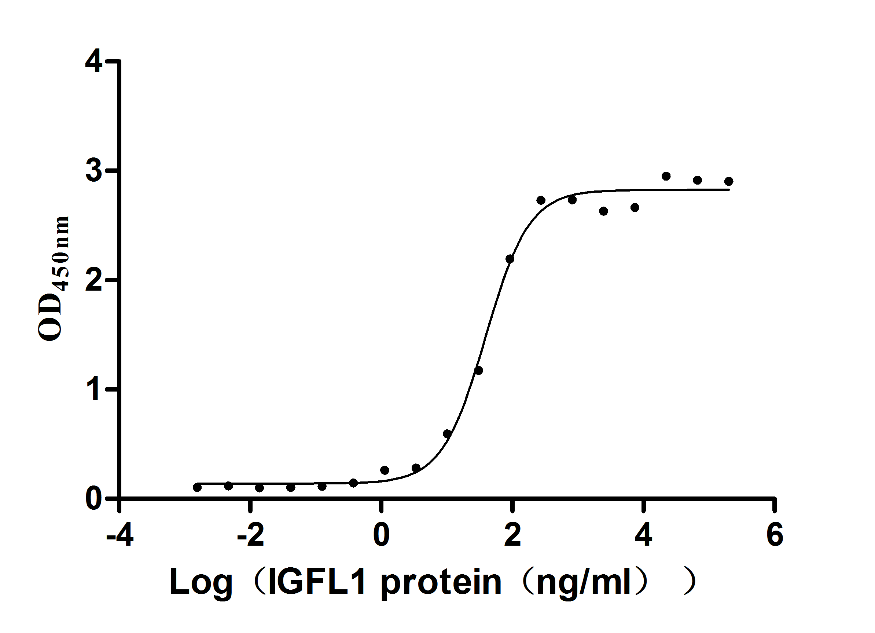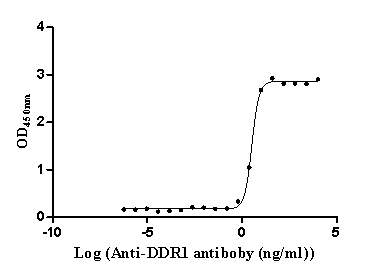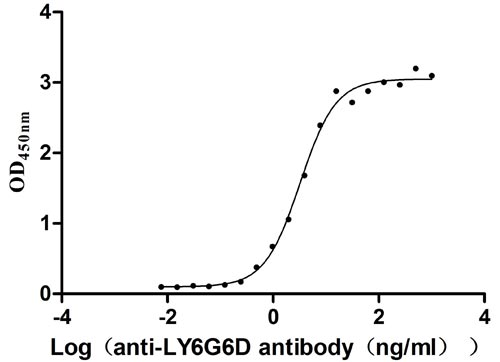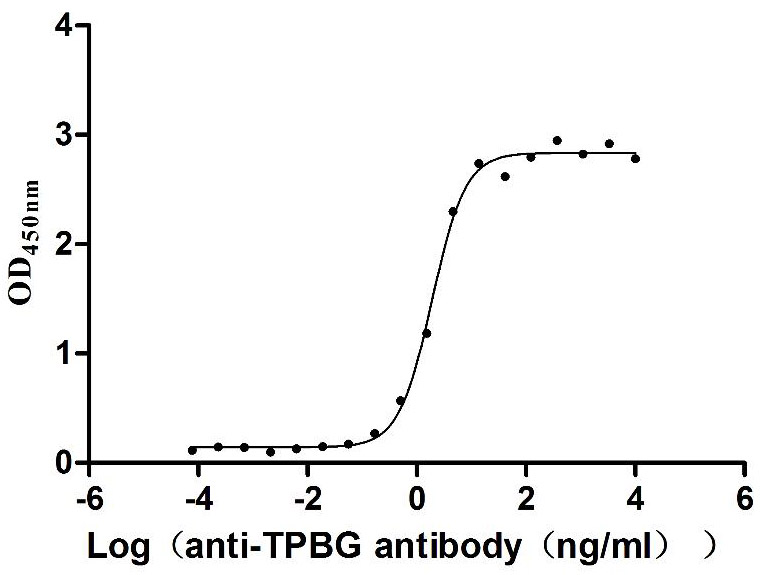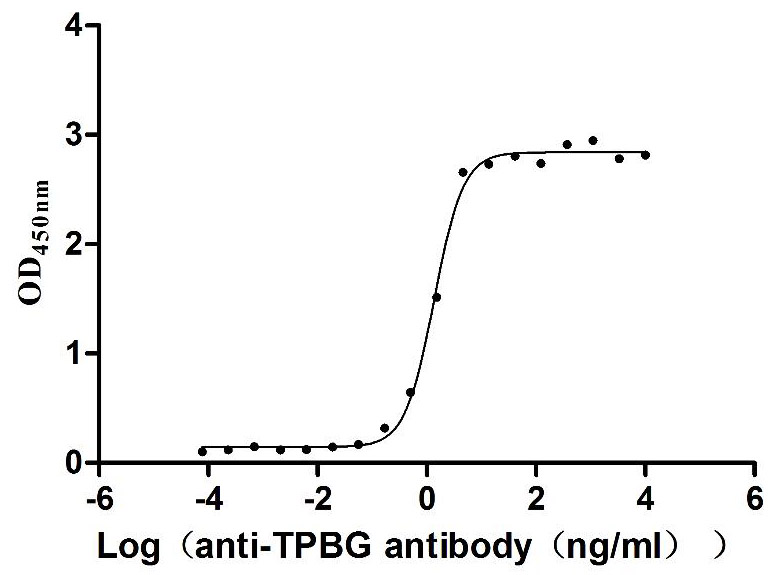Recombinant Mouse Tumor necrosis factor (Tnf), partial
-
中文名稱:小鼠Tnf重組蛋白
-
貨號:CSB-YP023955MO1
-
規(guī)格:
-
來源:Yeast
-
其他:
-
中文名稱:小鼠Tnf重組蛋白
-
貨號:CSB-EP023955MO1
-
規(guī)格:
-
來源:E.coli
-
其他:
-
中文名稱:小鼠Tnf重組蛋白
-
貨號:CSB-EP023955MO1-B
-
規(guī)格:
-
來源:E.coli
-
共軛:Avi-tag Biotinylated
E. coli biotin ligase (BirA) is highly specific in covalently attaching biotin to the 15 amino acid AviTag peptide. This recombinant protein was biotinylated in vivo by AviTag-BirA technology, which method is BriA catalyzes amide linkage between the biotin and the specific lysine of the AviTag.
-
其他:
-
中文名稱:小鼠Tnf重組蛋白
-
貨號:CSB-BP023955MO1
-
規(guī)格:
-
來源:Baculovirus
-
其他:
-
中文名稱:小鼠Tnf重組蛋白
-
貨號:CSB-MP023955MO1
-
規(guī)格:
-
來源:Mammalian cell
-
其他:
產(chǎn)品詳情
-
純度:>85% (SDS-PAGE)
-
基因名:Tnf
-
Uniprot No.:
-
別名:Tnf; Tnfa; Tnfsf2; Tumor necrosis factor; Cachectin; TNF-alpha; Tumor necrosis factor ligand superfamily member 2; TNF-a) [Cleaved into: Tumor necrosis factor; membrane form; N-terminal fragment; NTF); Intracellular domain 1; ICD1); Intracellular domain 2; ICD2); C-domain 1; C-domain 2; Tumor necrosis factor; soluble form]
-
種屬:Mus musculus (Mouse)
-
蛋白長度:Partial
-
蛋白標(biāo)簽:Tag?type?will?be?determined?during?the?manufacturing?process.
The tag type will be determined during production process. If you have specified tag type, please tell us and we will develop the specified tag preferentially. -
產(chǎn)品提供形式:Lyophilized powder
Note: We will preferentially ship the format that we have in stock, however, if you have any special requirement for the format, please remark your requirement when placing the order, we will prepare according to your demand. -
復(fù)溶:We recommend that this vial be briefly centrifuged prior to opening to bring the contents to the bottom. Please reconstitute protein in deionized sterile water to a concentration of 0.1-1.0 mg/mL.We recommend to add 5-50% of glycerol (final concentration) and aliquot for long-term storage at -20℃/-80℃. Our default final concentration of glycerol is 50%. Customers could use it as reference.
-
儲存條件:Store at -20°C/-80°C upon receipt, aliquoting is necessary for mutiple use. Avoid repeated freeze-thaw cycles.
-
保質(zhì)期:The shelf life is related to many factors, storage state, buffer ingredients, storage temperature and the stability of the protein itself.
Generally, the shelf life of liquid form is 6 months at -20°C/-80°C. The shelf life of lyophilized form is 12 months at -20°C/-80°C. -
貨期:Delivery time may differ from different purchasing way or location, please kindly consult your local distributors for specific delivery time.Note: All of our proteins are default shipped with normal blue ice packs, if you request to ship with dry ice, please communicate with us in advance and extra fees will be charged.
-
注意事項(xiàng):Repeated freezing and thawing is not recommended. Store working aliquots at 4°C for up to one week.
-
Datasheet :Please contact us to get it.
相關(guān)產(chǎn)品
靶點(diǎn)詳情
-
功能:Cytokine that binds to TNFRSF1A/TNFR1 and TNFRSF1B/TNFBR. It is mainly secreted by macrophages and can induce cell death of certain tumor cell lines. It is potent pyrogen causing fever by direct action or by stimulation of interleukin-1 secretion and is implicated in the induction of cachexia, Under certain conditions it can stimulate cell proliferation and induce cell differentiation. Induces insulin resistance in adipocytes via inhibition of insulin-induced IRS1 tyrosine phosphorylation and insulin-induced glucose uptake. Induces GKAP42 protein degradation in adipocytes which is partially responsible for TNF-induced insulin resistance. Plays a role in angiogenesis by inducing VEGF production synergistically with IL1B and IL6.; The TNF intracellular domain (ICD) form induces IL12 production in dendritic cells.
-
基因功能參考文獻(xiàn):
- Following Unfolded Protein Response activation during autosomal dominant retinitis pigmentosa progression, secrete TNFalpha and signal a self-destructive program to the cones, resulting in their cell death. PMID: 27750040
- In a hypercaloric environment, persistent elevation of microglial reactivity and consequent TNFalpha secretion induces mitochondrial stress in POMC neurons that contributes to the development of obesity. Specific disruption of the gene expressions of TNFalpha downstream signals TNFSF11A or NDUFAB1 in the mediobasal hypothalamus of diet-induced obese mice reverses mitochondrial elongation and reduces obesity. PMID: 28489068
- persistent stimulation with titanium particles may lead to a consistent release of TNF-alpha and IL-6 via SPHK-2 activity, which may lead to aseptic implant loosening PMID: 29728804
- Recognition memory improved with exercise in WT mice, was impaired in TNFR1(-/-) exercise mice, showed non-significant impairment with exercise in TNF(-/-) mice, and no changes in TNFR2(-/-) mice. In spatial learning there were exercise related improvements in WT mice, non-significant but meaningful impairments evident in TNFR1(-/-) exercise mice, modest improvement in TNF(-/-) exercise mice. PMID: 29969604
- In vitro mild uncoupling rescued from TNF-induced endothelial permeability, disassembly of cell contacts and VE-cadherin cleavage by the matrix metalloprotease 9 (capital EM, Cyrilliccapital EM, Cyrilliccapital ER, Cyrillic9). The uncouplers prevented TNF-induced expression of MMP9 via inhibition of NFkappaB signaling. PMID: 28131916
- macrophage-TNF-induced AKT/beta-catenin signalling in Lgr5(+) hair follicle stem cells has a crucial role in promoting hair follicle cycling and neogenesis after wounding PMID: 28345588
- Transmembrane TNF, TNFR2 and TNFR1 (indirectly) are critical for preventing inflammation during BCG-induced pleurisy in mice. PMID: 29973541
- findings demonstrate a new role for TNFalpha as a key regulator of neutrophil trafficking into and within lymphatic system in vivo. PMID: 28287124
- Our work suggested that TNF-alpha and TNF-R1 are the major contributors of TNF signaling pathway in anesthesia-induced spinal cord neurotoxicity. Targeting TNF-alpha / TNF-R1, not TNF-R2 signaling pathway may be the key component to rescue or prevent anesthesia-induced apoptotic injury in spinal cord neurons. PMID: 29802833
- observation from the present research work reveals that Quercetin suppressed the production of proinflammatory cytokines at different levels, such as TNF-alpha and IL-1beta, and inhibits the activation of I-kappaB phosphorylation, whereas the total content was not affected. PMID: 29322353
- this is the first evidence to suggest that TET2 mutations promote clonal dominance with aging by conferring TNFalpha resistance to sensitive bone marrow progenitors while also propagating such an inflammatory environment. PMID: 29195897
- Elevated A20 promotes TNF-induced and RIPK1-dependent intestinal epithelial cell death PMID: 30209212
- M. tuberculosis and TNFalpha synergise to induce necroptosis in murine fibroblasts via RIPK1-dependent mechanisms and characterized by phosphorylation of Ser345 of the MLKL necroptosis death effector. PMID: 28892415
- Our current study has demonstrated that in allergic airway disease (AAD) mice, intestinal dysbiosis (ID) caused increased nasal rubbing, sneezing, serum OVA specific IgE level and pro-inflammatory cytokine TNF-alpha in NALF and BALF. ID also inhibited miR-130a expression in AAD mice. Further molecular experiments indicated that miR-130a could specifically target and repress TNF-alpha mRNA expression. PMID: 29702281
- These data may indicate that insulin resistance in Adp(-/-) mice is likely caused by an increase in concentrations of TNFalpha and FFA via downregulation of PPARalpha. PMID: 29445073
- TNF-alpha is involved in cardiac PHLPP1 upregulation during reoxygenation, which is mediated by NF-kappaB transcriptional activity PMID: 29940243
- Lack of TNF-alpha signaling through Tnfr1 makes the mice more susceptible to acute infection but does not alter state of latency and reactivation of HSV-1. PMID: 29113822
- although TNFalpha does not induce osteoclastogenesis alone, it does work with RANKL to induce osteoclastic differentiation, and the NFkappaB pathway may serve an important role in this process. PMID: 29512766
- two different modes of necroptosis induction by TNFalpha exist which are differentially regulated by iuRIPK1 formation. Overall, this work reveals a distinct mechanism of RIPK1 activation that mediates the signaling mechanism of RDA as well as a type of necroptosis. PMID: 29891719
- Results demonstrate a critical role for the TRPM2 channel in Abeta42-induced microglial activation and generation of TNF-alpha: PKC/NOX-mediated generation of ROS and activation of PARP-1 are required for Abeta42-induced TRPM2 channel activation and, furthermore, the PYK2/MEK/ERK signaling pathway as a positive feedback mechanism downstream of TRPM2 channel activation facilitates further activation of PARP-1 and TRPM2 ... PMID: 29143372
- TNFalpha may act reciprocally with DRA, leading to the development of intestinal inflammation. PMID: 29286110
- TNF-alpha plays a pivotal role in the development of nonalcoholic fatty liver disease and progression to nonalcoholic steatohepatitis. PMID: 28922680
- Cross-fostering and conditional knockout experiments indicated that a TNF-alpha deficit in the maternal brain, rather than in the hematopoietic system, and during gestation was responsible for the low-fear offspring phenotype. PMID: 29199072
- In a retinitis pigmentosa mouse model, TrkC activity generates phosphorylated Erk, which upregulates glial TNF-alpha, causing selective neuronal death. PMID: 29242588
- genome-wide knockdown of 19 ribosomal proteins resulted in decreased IL-10 and increased TNF-alpha production. PMID: 29657255
- We conclude that one of the possible regulatory mechanisms of TNF in mechanical orofacial hyperalgesia involves upregulation of the nociceptor TRPV1 PMID: 29132095
- The work highlighted the modulatory role of miR-105 in TNF-alpha-induced epithelial-mesenchymal transition and promoting colorectal cancer metastasis. PMID: 29238068
- These results suggest that glucocorticoids' effects on adipose tissue immune response, both in a pro- and an anti-inflammatory manner, depend on the nutritional status. PMID: 29847081
- This study demonstrated that TNF-alpha genetic deletion ameliorates the amyloid phenotype of the 5XFAD mouse model of AD. 5XFAD/TNF-alpha-/- mice exhibit significantly decreased amyloid deposition and reduced levels of AbetaPP-CTFs and amyloid-beta protein. PMID: 28826177
- Data suggest that expression of Tnfa in adipocytes can be regulated by dietary fatty acids; here, polyunsaturated fatty acids regulate Tnfa expression via alteration in methylation of Tnfa promoter in rats fed polyunsaturated fatty acids (safflower oil versus coconut/olive oil) and in mouse adipocyte cell line incubated with polyunsaturated fatty acid (linoleic acid versus palmitic/oleic acids). PMID: 28575756
- a precise mechanism for attenuation of HgCl2-induced liver dysfunction by dietary luteolin via regulating Sirt1/Nrf2/TNF-alpha signaling pathway, and provide a foundation for further study of luteolin as a novel therapeutic agent against inorganic mercury poisoning. PMID: 27853236
- a significant increase in plasma levels of IL-2, IFN-g and TNF-a was revealed as assessed by ELISA. In conclusion, the results of the present study indicate that MENK has a cytotoxic effect on B16 melanoma cells in vitro and in vivo, and suggest a potential mechanism for these bioactivities. PMID: 28849104
- findings suggest that PGRN deficiency leads to excessive NF-kappaB activation in microglia and elevated TNFalpha signaling, which in turn lead to hyperexcitability of medium spiny neurons and obsessive-compulsive behavior-like behavior. PMID: 28438992
- findings highlight an epigenetic mechanism by which EZH2 integrates the multifaceted effects of TNFalpha signaling to promote the inflammatory response and apoptosis in colitis. PMID: 28439030
- It is possible that JNK and TNF-alpha commonly contribute to kidney damage by assembling a positive feedback cycle after crush syndrome, leading to increased apoptosis in the renal cortex. HMGB1 from the muscle may be the trigger. PMID: 28701229
- Cytokine-inducing and anti-inflammatory activity of chitosan and its low-molecular derivative. PMID: 29513410
- Excessive death of hepatocytes is a characteristic of liver injury. A new programmed cell death pathway has been described involving upstream death ligands such as TNF and downstream kinases such as RIPK1. PMID: 28088582
- Taken together, we have demonstrated a role for TNF in the development of classically activated macrophages in listeriosis PMID: 28545808
- Inhibition of signaling stimulated by both TNF and IL1beta synergizes with NF-kappaB inhibition in eliminating leukemic stem cells. PMID: 28039479
- Calyptranthes grandifolia O.Berg (Myrtaceae) ethanolic extract inhibits TNF-alpha gene expression and cytokine release in vitro PMID: 28447740
- Results show that interleukin 6 (IL6) promotes oval cell proliferation and liver regeneration, while tumor necrosis factor alpha (TNFalpha) and TNF receptor-1(TNFR1) do not affect this process. PMID: 27556180
- This study adds to the evidence that both peripheral and brain region-specific increases in tumor necrosis factor alpha lead to both sickness and depression- and anxiety disorder-relevant behavior and do so via different pathways. PMID: 27515532
- Lactosylceramide-Induced Phosphorylation Signaling to Group IVA Phospholipase A2 via Reactive Oxygen Species in Tumor Necrosis Factor-alpha-Treated Cells. PMID: 28444900
- The current study demonstrated that honey can stimulate or suppress the mRNA expression of some pro-inflammatory cytokines in mice brains. Furthermore, honey suppresses the TNF-alpha mRNA expression in the presence of T. gondii infection but it stimulates the IL-1beta and IL-6 mRNA expression. Treatment of the mice with honey reduces parasite multiplication in the brain. PMID: 27591508
- aerobic interval training enhanced the anti-inflammatory indices IL-10/TNF-alpha ratio and IL-15 expression in skeletal muscle in tumor-bearing mice. PMID: 27863332
- findings suggest that activation of Tnf-Aicda axis and co-inhibitory signals to T cells in coordination with Th1-type immunity has critical roles in the immune response against Hepatitis B virus infection PMID: 28063995
- Taken together, we speculate that DT-13 inhibits endothelium vascular inflammation through regulating nitric oxide production and the expression of ROS, TNFR, IL-8, MCP-1, which are associated with inflammation. PMID: 29162452
- TNF signalling is required for the expansion and differentiation of pathogenic IFNgamma+CD4+ T cells that promote the irreversible loss of bone marrow function. PMID: 28671989
- Drugs targeting XIAP and cIAP1/2 may be effective for osteosarcoma patients whose tumors express abundant RIPK1 and contain high levels of TNFalpha. PMID: 27129149
- Taken together, we indicated that anti-IL-6 and anti-TNF-alpha therapy prevent intestinal permeability induced by intestinal inflammation PMID: 27155817
顯示更多
收起更多
-
亞細(xì)胞定位:Cell membrane; Single-pass type II membrane protein.; [Tumor necrosis factor, membrane form]: Membrane; Single-pass type II membrane protein.; [Tumor necrosis factor, soluble form]: Secreted.; [C-domain 1]: Secreted.; [C-domain 2]: Secreted.
-
蛋白家族:Tumor necrosis factor family
-
數(shù)據(jù)庫鏈接:
Most popular with customers
-
Recombinant Human IGF-like family receptor 1 (IGFLR1), partial (Active)
Express system: Mammalian cell
Species: Homo sapiens (Human)
-
Express system: Mammalian cell
Species: Macaca fascicularis (Crab-eating macaque) (Cynomolgus monkey)
-
Recombinant Human Claudin-9 (CLDN9)-VLPs (Active)
Express system: Mammalian cell
Species: Homo sapiens (Human)
-
Recombinant Human Epithelial discoidin domain-containing receptor 1 (DDR1), partial (Active)
Express system: Mammalian cell
Species: Homo sapiens (Human)
-
Express system: Mammalian cell
Species: Homo sapiens (Human)
-
Recombinant Human Lymphocyte antigen 6 complex locus protein G6d (LY6G6D) (Active)
Express system: Yeast
Species: Homo sapiens (Human)
-
Recombinant Macaca fascicularis Trophoblast glycoprotein (TPBG), partial (Active)
Express system: Mammalian cell
Species: Macaca fascicularis (Crab-eating macaque) (Cynomolgus monkey)
-
Recombinant Human Trophoblast glycoprotein (TPBG), partial (Active)
Express system: Mammalian cell
Species: Homo sapiens (Human)


